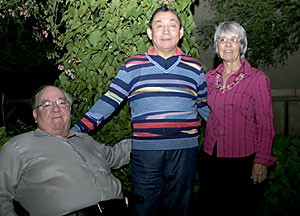Which city, located in an area of arid desert and surrounded by mountains, has a population of about one million, a large university and is considered one of the commercial centers in the region?
Tucson?
Not even close – try Almaty, Kazakhstan, a sister city to Tucson and the hometown of 31 University of Arizona exchange students.
“”The program started in 1987, back when it was still the Soviet Union,”” said Jerry Gary, chair emeritus of the Tucson-Almaty Sister City Committee. “”We started an outreach program – a peace outreach type of thing.””
Since then, the committee has helped exchange aid, culture and individuals between Tucson and Almaty, sending hundreds of people to and from the two cities, Gary said.
He said he has been involved with the program since 1991, the year of Kazakhstan’s independence from the former Soviet Union.
The rector of the Al-Farabi Kazakh National University, Tolegen Kozhamkulov, visited the UA campus Tuesday as part of the outreach program.
“”We’re hoping that this visit by the rector will help us get more deeply involved in exchanging students and professors,”” Gary said. As rector, Kozhamkulov holds a position equivalent to UA President Robert Shelton’s, Gary said.
Al-Farabi is the Kazakhstan’s largest and most recognized national university, Kozhamkulov said. It offers bachelor’s, master’s and doctoral degree programs in 68 majors.
While on the UA campus, Kozhamkulov and Talgat Seitov, head of International Cooperation Services at Al-Farabi and the rector’s translator, visited the Steward Observatory Mirror Laboratory and the College of Optical Sciences, Gary said.
“”His assistant, Talgat, said they were very, very impressed with the scientific advances that are being made at the UA,”” he said.
Kozhamkulov also made note of the UA’s contribution to the exploration of Mars, comparing it to Kazakhstan’s contribution to the former Soviet Union’s space program.
Kazakhstan is home to the original launching site of the Sputnik satellite launched in 1957, the first man-made object to orbit Earth, Kozhamkulov said.
The sister city committee has also helped exchange a number of students between the two universities, Gary said, adding that several students from Tucson have gone to Al-Farabi to study the Russian language.
Ted Brockhuis, a former photo editor for the Arizona Daily Star, met his wife while studying in Almaty, Gary said. They now live in Tucson.
Kazakh students who have come to the UA in the past mostly came to study English or get an education degree before returning home to Kazakhstan, Gary said.
Yerbolat Zhumakhmetov, a finance junior in the Eller College of Management, came to Tucson from Almaty in 2004, where he spent a year at Amphitheater High School before enrolling at the UA.
Originally sent as part of the U.S. State Department’s Future Leaders Exchange Program, Zhumakhmetov said he went through an extensive application process to study here in Tucson.
Of the 50,000 students from around the region that apply each year to the program, only about 1,200 are accepted, he said. Zhumakhmetov spent his first year with a host family and, after returning to Tucson, decided to remain with them, he said.
One of the obstacles he faced was the language barrier, Zhumakhmetov said.
“”When I came to the U.S., it seemed like everyone spoke totally different English,”” he said. “”I couldn’t understand them.””
Homesickness was another issue.
“”The first time I left my family and friends, I had to be gone for a year – I couldn’t go home for Christmas,”” Zhumakhmetov said. “”At first, it seemed terrible. But in May when it was time to leave, I didn’t want to leave.””
Kazakhstan has received some unexpected attention lately, no doubt due to Sacha Baron Cohen’s 2006 hit comedy film “”Borat: Cultural Learnings of America for Make Benefit Glorious Nation of Kazakhstan.””
While the movie does have some moments that Zhumakhmetov considered offensive, he knew it was “”nothing personal.””
“”We realized it is a funny movie, it was made for fun,”” he said. “”Good, bad or indifferent, it made people aware of Kazakhstan.””
There are some major social and cultural differences between Tucson and Almaty, Zhumakhmetov said.
One of the differences Zhumakhmetov noticed is that families in Kazakhstan remain much more tightly-knit than they do in the United States.
“”We believe that there’s nothing closer than family,”” he said.
Back in Almaty, he would get together with his extended family every weekend, and refers to his cousins as his brothers and sisters.
In addition to facilitating the exchange of students, the Tucson-Almaty Sister City Committee has helped to send medical professionals and government administrators between the two cities, Gary said.
Doctors, nurses, technicians and lab workers have gone to Almaty to work in hospitals and to host seminars, Gary said. In exchange, government officials have come to Tucson to study U.S. governmental systems as part of a U.S. State Department program.
When Gary visited Kazakhstan on a mission to learn how people with disabilities were treated there, he noticed a significant lack of wheelchairs for the disabled.
“”What I discovered there gave me a lifelong desire to send wheelchairs,”” he said. In 2002, the committee sent 240 wheelchairs to Kazakhstan for those in need, he said.
The committee has also brought the unique Kazakh culture to Arizona, Gary said. In 2004, the Kazakh National Folk Ensemble came to Tucson and the Isker Almaty Boys Choir is expected to perform in Tucson in January 2008.
“”The experience has made me a more mature and independent person,”” Zhumakhmetov said. He plans to remain in the United States after he graduates to get some work experience, but eventually plans on returning to Kazakhstan.
“”It may sound patriotic, but I want to work to benefit my country,”” he said.









